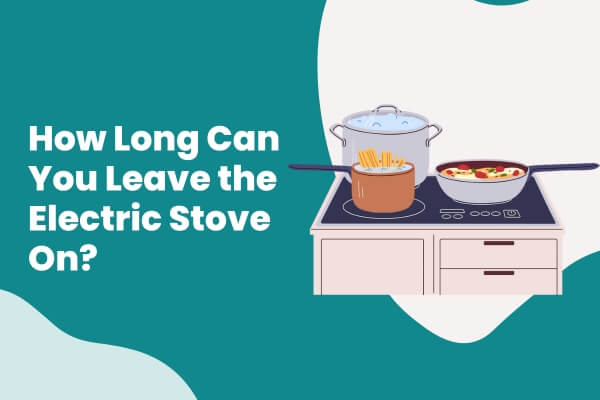An electric stove is a common household appliance for cooking and heating food. It has become an essential part of modern kitchens, offering convenience and ease of use. However, there are concerns about the safety of leaving an electric stove on for extended periods.
What Happens If You Leave an Electric Stove On?
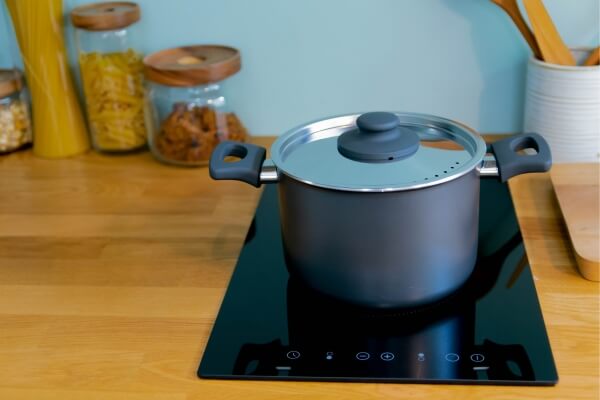
Electric stoves are convenient and easy-to-use appliances in the kitchen. However, leaving them unattended can pose serious dangers that should not be ignored. Here’s an overview of the potential risks of leaving an electric stove on, along with the possible consequences:
The dangers of leaving an electric stove on:
Fire Hazard
A fire risk is one of the main dangers of leaving an electric stove on. The heating element can get extremely hot and ignite any nearby flammable materials, such as paper, plastic, or curtains. This can lead to a catastrophic fire that can cause severe damage to your property or even result in injury or death.
Energy Waste
Leaving your electric stove on unnecessarily can also lead to energy waste. Not only does this increase your utility bills, but it can also harm the environment by increasing carbon emissions.
Possible consequences
Fire
Fire risk is the most significant consequence of leaving an electric stove on. The heat generated by the heating element can easily ignite nearby flammable materials, resulting in a devastating fire that can cause severe damage to your home and put your life in danger.
Electrical Shock
Another potential consequence of leaving your electric stove on is electrical shock. If your appliance or wiring is faulty, leaving the stove on can cause a power surge that can shock you or even start a fire.
Safety Hazards
Leaving your electric stove on for an extended period can be dangerous for pets or children who may wander into the kitchen. They could accidentally touch the hot stove and get burned or even cause a fire if they knock over any flammable materials nearby.
Importance of Checking for Automatic Shut-off Features
Having an automatic shut-off feature on your electric stove can provide peace of mind and help prevent dangerous situations from occurring. It is crucial to check your appliance for this feature and ensure it functions properly. Also, following the manufacturer’s guidelines for safely using and maintaining your electric stove is important to avoid any potential hazards.
Automatic Shut-Off Features and Time Limits
Electric stoves have become safer over the years due to advancements in technology. One of the safety features that has been implemented in modern electric stoves is an automatic shut-off feature. This feature is designed to turn off the stove if left on for an extended period, reducing the risk of fires and other safety hazards.
Electric stoves with touchpad clocks have automatic shut-off features. If your electric stove has a touchpad clock and control screen, it indicates that your stove was manufactured after 1995 and has an auto shut-off system. This system activates and turns off your oven if you leave it open for 12 hours.
If you accidentally leave your electric stove on and forget to turn it off, the automatic shut-off feature will activate and turn it off after 12 hours. This useful safety feature helps prevent potential fire hazards or other accidents if the stove was left on for an extended period.
It’s worth noting that most electric stoves should automatically shut off after 12 hours of being on. However, checking your stove’s manual is essential to see if it has an automatic shut-off feature and how long it can be left on without turning off. If your stove doesn’t have this feature, it’s vital to remember to turn it off after use to prevent any accidents from occurring.
Can Electric Stoves Cause Fires if left on?
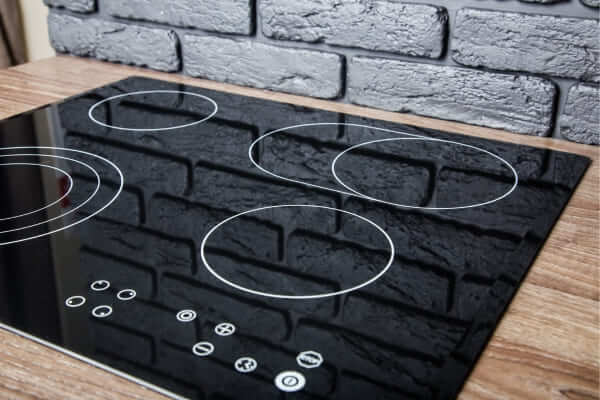
Electric stoves can cause fires if left on for an extended period. If any flammable materials, such as paper towels, wooden utensils, or plastic items, are left near the stove’s heating element, they can catch fire if they come into contact with the heat. Moreover, if the stove is faulty or has damaged wiring, leaving it on for an extended period can lead to a power surge, which can cause a fire.
It is crucial to understand that any appliance, including electric stoves, can malfunction and cause fires. Therefore, it’s essential to take preventive measures to avoid such incidents. One way to reduce the fire risk is to ensure that the stove is in good condition and well-maintained. Also, avoid leaving flammable materials near the stove, and never leave the stove unattended for an extended period. It’s also crucial to have working smoke detectors in your home to detect and alert you in case of a fire.
Tips to prevent electric stove fires:
There are several tips that you can follow to prevent electric stove fires:
Never leave your electric stove unattended: Always stay in the kitchen while cooking, and keep an eye on the stove. If you need to leave the kitchen, turn off the stove first.
Keep the stove clean: Food residue and grease buildup can increase the risk of fire. Clean your stove regularly to prevent any potential fire hazards.
Use proper cookware: Use cookware that is appropriate for your stove and is not damaged. Avoid using cookware with loose handles or damaged bottoms.
Don’t overload your stove: Avoid overloading your stove with too many pots and pans. This can cause overheating and increase the risk of fire.
Keep flammable materials away: Keep flammable materials such as dish towels, curtains, and paper towels away from the stove. Store them at a safe distance from the stove.
Install smoke detectors: Install smoke detectors in your kitchen and check them regularly to ensure they are working. Smoke detectors can alert you in case of a fire and give you enough time to evacuate.
These tips can significantly reduce the risk of electric stove fires and keep your home and family safe.
Can Electric Stoves Explode if I leave them on overnight?
It is highly unlikely that an electric stove will explode if left on overnight. Electric stoves use heating elements to produce heat, and they do not have any combustible materials that could explode. However, leaving an electric stove on for an extended period of time can still be dangerous for other reasons, as mentioned earlier.
It is important to note that while electric stoves do not typically explode, leaving flammable materials near a hot stove can be hazardous. The heat from the stove can cause flammable items such as paper, plastic, or fabric to catch fire and potentially cause an explosion. Therefore, keeping the area around your electric stove clear of flammable materials is crucial to prevent potential hazards. Also, it is always best to follow safety guidelines and not leave your electric stove unattended for an extended period.
Tips to Prevent Electric Stove Explosions
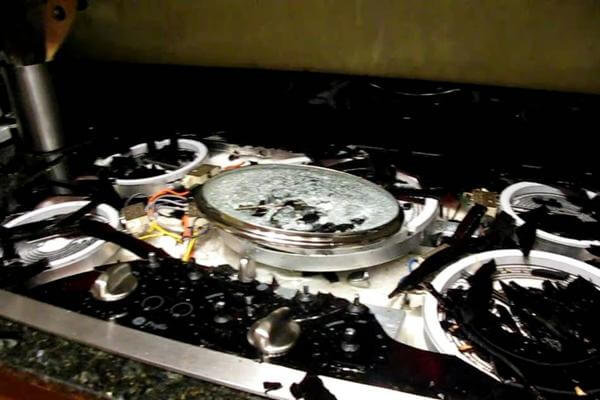
Since electric stoves do not use gas, the risk of an explosion is very low. However, to prevent any potential safety hazards, here are some tips:
- Do not leave your electric stove on for an extended period, especially overnight.
- Regularly inspect the power cord and outlet to ensure they are not damaged.
- Keep the area around the stove clear of any flammable objects, such as paper towels or curtains.
- Do not use the stove as a heating source for your home, as this can cause overheating and potential damage to the stove.
- If you notice any unusual smells or sounds coming from your electric stove, turn it off immediately and contact a professional for repair or replacement.
Electric Stove Safety Tips
Here are 10 tips to ensure electric stove safety:
#1 Don’t leave the stove unattended: Always stay in the kitchen when you’re cooking, and keep an eye on the stove. Avoid leaving the stove unattended for long periods, especially when something is cooking on it.
#2 Keep flammable objects away: Keep flammable objects such as paper towels, dish towels, and curtains away from the stove. These materials can easily catch fire if they come in contact with the heating element.
#3 Don’t overload the stove: Avoid placing too many pots and pans on the stove simultaneously. Overloading the stove can cause it to overheat, potentially causing a fire.
#4 Clean the stove regularly: Keeping the stove clean is essential for preventing fires. Food spills and grease can ignite if they come in contact with the heating element. So, make sure to clean the stove regularly.
#5 Check the power cord and plug: Check the power cord and plug for any signs of damage or wear and tear. Damaged cords or plugs can cause electrical shocks, fires, or even explosions.
#6 Don’t touch the stove with wet hands: Avoid touching the stove with wet hands, as water is a conductor of electricity. Wet hands can cause electrical shocks, which can be dangerous.
#7 Use the right cookware: Use cookware suitable for the stove’s heating element. If the cookware is too small, it can overheat, and if it’s too large, it can cause heat to transfer to the surrounding areas.
#8 Use the stove’s automatic shut-off feature: Most electric stoves have an automatic shut-off feature that turns off the stove after a set period. Use this feature to prevent the stove from overheating or starting a fire.
#9 Keep the stove well-ventilated: Ensure the kitchen is well-ventilated, especially if you’re using the stove for an extended period. A well-ventilated kitchen helps prevent carbon monoxide poisoning.
#10 Install a smoke detector: Installing a smoke detector in the kitchen can alert you in case of a fire. Make sure the smoke detector is working correctly and replace the batteries regularly.
What Will Happen If You Accidentally Leave Your Stove On?
A few things could happen if you accidentally leave your electric stove on. The severity of the outcome depends on how long the stove has been on and whether there are any flammable materials nearby. Here are some possible outcomes:
- Fire: Leaving an electric stove on can cause a fire. Any flammable materials nearby, such as paper or kitchen towels, could catch fire if they come into contact with the hot stove.
- Energy waste: Leaving an electric stove on when not in use wastes energy and can increase your electricity bill.
- Overheating: If the stove is left on for an extended period, it may overheat, which can cause damage to the stove itself.
- Overcooked food: If you leave your food on the stove for too long, it may become overcooked or burnt.
- Smoke and fumes: Leaving your stove on for too long can cause smoke and fumes to build up in your kitchen, harming your health.
Turning off your electric stove as soon as you realize you have left it on is important. Suppose you are still determining whether the stove has been on for too long or whether there are any hazards present. In that case, it is always best to call a professional electrician or fire department to inspect the area.
What To Do When an Electric Stove Is Left On
If you discover that you have accidentally left your electric stove on, it is important to take action immediately to prevent any potential hazards. Here are some steps to follow:
Step 1: Turn off the stove
The first and most important step is immediately turning off the electric stove. Locate the stove’s power switch and turn it off.
Step 2: Unplug the stove
If you cannot locate the stove’s power switch, or if the stove does not have one, unplug the stove from the wall.
Step 3: Check for damage
Check the stove for any signs of damage or wear and tear. Look for frayed cords or damaged heating elements, which could be the cause of the stove being left on.
Step 4: Ventilate the area
Open windows and doors in the kitchen to ventilate the area and allow any fumes to escape.
Step 5: Check for fire hazards
Look for fire hazards, such as flammable objects or materials that may have been left too close to the stove. Move any hazardous items away from the stove.
Step 6: Monitor the stove
Keep an eye on the stove for a while after turning it off to ensure that it has cooled down properly and that there are no signs of further problems.
Step 7: Seek professional help
If you are unsure about your stove’s condition or suspect it may have been damaged, call a professional electrician to inspect it and determine if any repairs are needed.
Remember that prevention is always better than cure. Ensure proper safety measures when using your electric stove to minimize the risk of accidents or hazards.
How Long Can an Electric Stove Stay On?
Most electric stoves are designed to stay on for several hours, but following the manufacturer’s guidelines and safety recommendations is important. Leaving an electric stove on for up to 12 hours is safe. After that, the stove’s automatic shut-off feature should act to prevent any potential safety hazards. However, suppose your electric stove does not have an automatic shut-off feature. In that case, it’s best to avoid leaving it on for an extended period to prevent any potential fire hazards or other safety issues. It’s also important to monitor the stove while it’s in use and never leave it unattended.
Is It Okay To Leave an Electric Stove On Overnight?
It is generally not recommended to leave an electric stove on overnight. Even with automatic shut-off features, fire or other hazards are still risky. It is better to turn off the stove and unplug it before bed to ensure safety. Also, leaving the stove on overnight can result in unnecessary energy waste and higher electricity bills.
Electric Stove Power Consumption and Cost if Left on
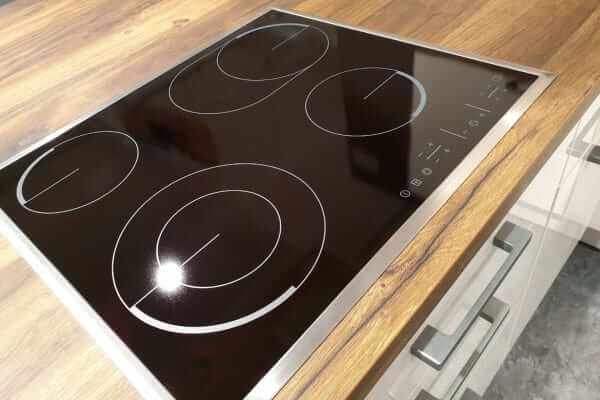
Electric stoves are a common household appliance used for cooking food. However, they consume significant electricity and can contribute to your monthly energy bill. The power consumption of an electric stove depends on its size and power output. On average, an electric stove with four burners and an oven can consume between 2,400 to 3,000 watts of power per hour when all burners are in use.
Using an electric stove also depends on the cost of electricity in your area and the amount of time you use it. For example, if you use an electric stove for one hour per day, and your electricity rate is $0.12 per kilowatt-hour (kWh), then you can expect to pay around $10-$15 per month for the stove’s electricity consumption.
To reduce the cost of using an electric stove, you can take the following steps:
- Use the right-sized pots and pans to fit the burner size to reduce energy loss.
- Use lids on pots and pans to retain heat and reduce cooking time.
- Use the oven light instead of opening the oven door to check food progress to minimize heat loss.
- Clean the burners and coils regularly to maintain efficient heat transfer.
- Turn off the burner a few minutes before the food is ready to let the residual heat finish the cooking process.
- Use a pressure cooker or microwave for quick food cooking rather than relying on the stove.
- Consider using alternative cooking methods like grilling, slow cookers, or induction cooktops which may consume less power.
- Turn off the stove when it is not in use.
- Unplug the stove when not in use to prevent any standby power consumption.
- Compare electricity rates of different utility providers and switch to a cheaper one if possible.
Conclusion
Electric stoves are a convenient and efficient way to cook, but they can also pose safety risks if not used properly. Leaving an electric stove on for an extended period can result in fire hazards, electrical shock, and energy waste. However, modern electric stoves have automatic shut-off features to mitigate these risks.
To ensure the safe use of electric stoves, it is essential to follow safety tips such as keeping flammable objects away, using proper cookware, and avoiding leaving the stove unattended. Also, it is important to know what to do in case of an accident, such as turning off the stove and airing out the house. By taking these precautions, electric stoves can be a reliable and safe appliance to use in the kitchen.

